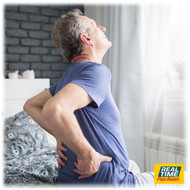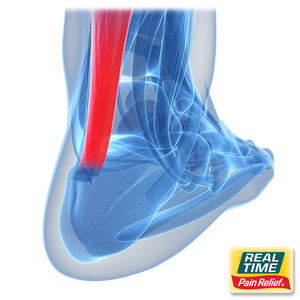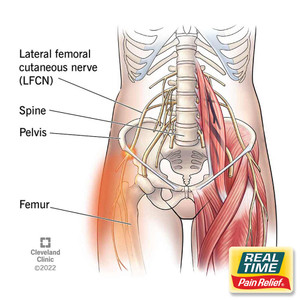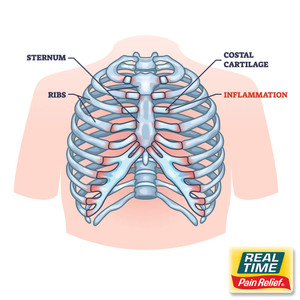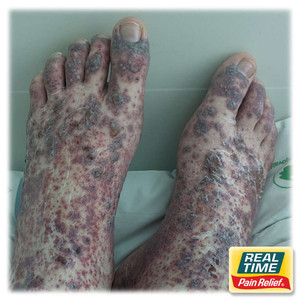10 Tricks to Fall Asleep Despite Chronic Pain
24th Nov 2021
Is chronic pain affecting your ability to fall asleep at night? You are not alone!
Chronic pain certainly tends to cause sleep issues, and poor sleep can make pain even worse. Researchers have shown that better sleep reduces pain both during the night and day. But, how do you break the toruturous cycle of bad sleep and chronic pain?
It might be overwhelming at first, but finding a different approach to how you prepare yourself for sleep can help improve your quality of sleep, which in turn, can help to reduce your pain and improve your overall quality of life.
Here are 10 tricks that might help you fall asleep despite chronic pain!
#1) Elevation
If you experience inflammation in the knees, legs, or feet, elevate these areas with a soft, but firm pillow. This will help decrease the inflammation.
If you have poor circulation in your lower extremities, elevating your arms or torso too will allow for more blood flow. The same goes for the upper body. The idea is to position yourself for better circulation.
You may be able to find your ‘goldilocks’ position with the help of small pillows and other pads.
#2) Avoid Pre-Sleep Distractions
Some intriguing research shows a correlation between using an electronic device before bedtime and dealing with sleep disorders. Researchers have found that a device’s glowing lights prevents the release of melatonin in the body, a natural chemical that causes drowsiness.
Not only are the blue screens bad for your eyes while in the dark, but the added distraction can also stimulate the brain when it needs to be winding down for sleep.
#3) Relaxing Bath or Shower
Taking a hot shower or bath about 30 minutes to 1 hour before bedtime can work wonders for sleep. It is a nice way to release stress and to give your muscles, bones, and joints a hydrotherapy session. You could also add a pain relieving, fizzy bath bomb containing Arnica Montana to a warm bath tub; it will benefit pain, stiffness, and bruising.
To soothe away stress, you can try adding some relaxing aromatherapy oils to your bath. Some of the best ones are lavender, Roman chamomile, bergamot, clary sage, or ylang ylang. Just add a few drops to the water, or pour several drops in a corner of the shower floor. The warm environment will cause them to diffuse.
#4) Heat Therapy
Heating pads and blankets are a great way to relax and soothe aches and pains before dozing off. Heat therapy can help to promote blood flow, dilate blood vessels, and decrease pain and tension.
#5) Watch Caffeine Intake
Keeping an eye on caffeine intake can help with sleep issues. Caffeine can affect the body for up to 8 hours after consuming a caffeinated beverage. If you think caffeine may be part of the problem, consider cutting back on your daily intake and try to avoid caffeinated beverage after a certain time in the afternoon.
#6) Cold Therapy
Cold therapy can be beneficial for reducing pain. It reduces blood flow to sore limbs, which helps to reduce inflammation, swelling, and pain. An hour or two before bedtime, apply an ice pack for 20 minutes. Applying cold therapy to sore joints before bedtime can help prevent stiffness upon waking.
#7) Topical Pain Relief Lotion
Topical pain relief lotions can be an effective way to decrease pain, cramps, and other types of aches. Plus, they have fewer possible side effects than pills. Look for pain relief lotions containing ingredients like menthol, trolamine salicylate, arnica montana, glucosamine, and turmeric. Capsaicin is another great ingredient to find in a topical pain relief lotion.
#8) Check Your Mattress
You spend nearly 1/3 of your life on your mattress, so trying to find the best one for you is worth it. One thing to remember: your sleeping position might determine the type of bed that you need. If you need advice, you can talk to a medical specialist about the right kind of mattress for you.
#9) Natural Sleeping Aids
Before reaching for an over-the-counter sleep aid, consider trying a natural alternative.
Chamomile and valerian root tea promote relaxation and are great to drink before bedtime. You can also take a melatonin supplement, which can help to promote relaxation.
Diffusing lavender oil in your room is also beneficial for promoting relaxation. The scent is therapeutic and can help to prepare your body for a good night’s rest.
#10) Create Your Perfect Sleeping Environment
Create an environment that is perfect for you to sleep in. You can experiment with the room’s temperature, white noise, aromatherapy, natural sounds, humidifier or dehumidifier (depending on your region), or devices to help your breathing. A little online research will present a plethora of possibilities when it comes to creating a healthy sleeping environment.
Conclusion
Hopefully some of these tips help you get better sleep at night! Chronic pain is bad enough during the day, and anything you can do at night to get better sleep is worth trying.
Pain Relief You Can Trust® Since 1998
For over 20 years, families across the U.S. have turned to Real Time’s lotions and creams for PAIN RELIEF YOU CAN TRUST®. From Lifestyle Essentials, through our Nujuvena line, to Pain Relief Formulas, Real Time has you covered. LEARN MORE

